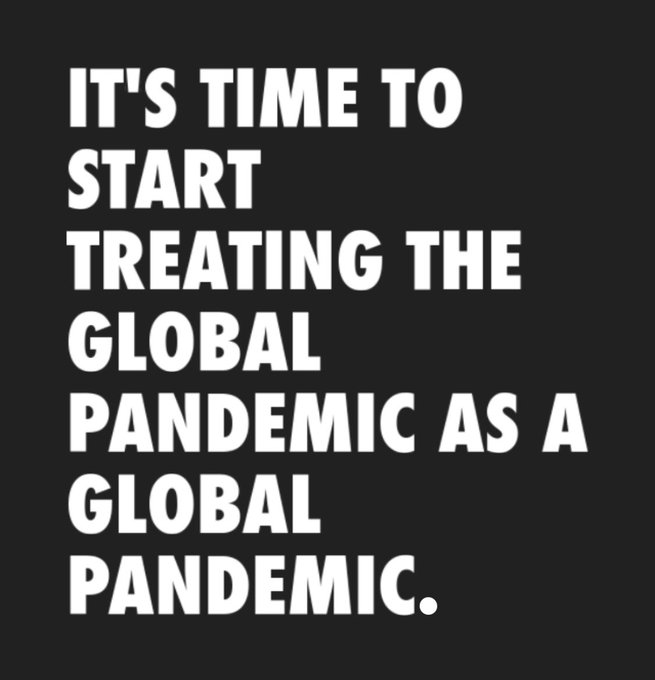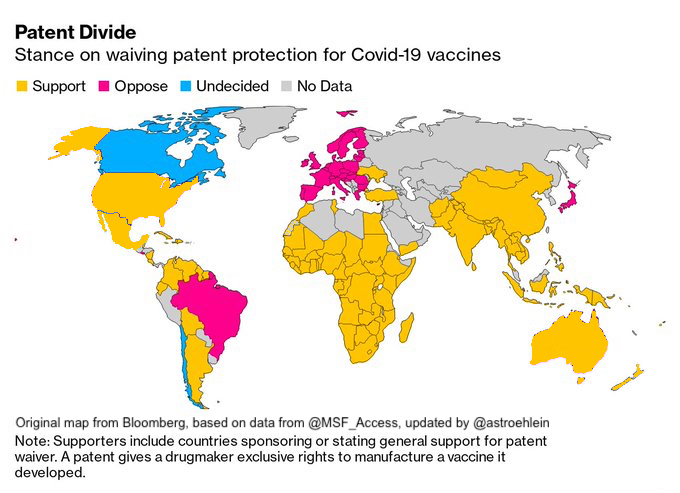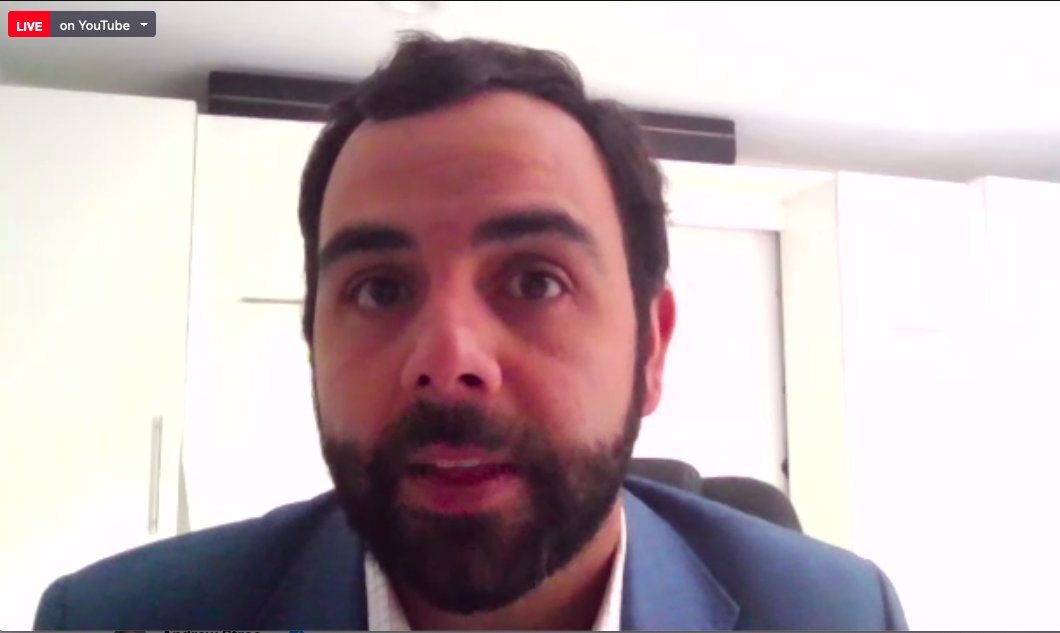
The EU is blocking wider vaccine production globally by obstructing the #TRIPSwaiver, a proposal to temporarily waive some intellectual property (IP) rules on vaccines & other health products.
European Commission attempts to justify this are based on lies.
💥 Now, 7 truths…
European Commission attempts to justify this are based on lies.
💥 Now, 7 truths…

💥 TRUTH 1: Intellectual property is currently a barrier to swiftly scaling up and diversifying the production of Covid-19 health products, including vaccines.
The European Commission claims otherwise, but right now, there are manufacturers with capacity to produce additional vaccines & other health products; however, they are unable to contribute because they do not yet have the right licenses. IP is a barrier to them.
You can find such manufacturers in, for example…
Bangladesh: apnews.com/article/drug-c…
Canada: theglobeandmail.com/world/article-…
Denmark: thelocal.dk/20210202/danis…
India: thehindu.com/opinion/op-ed/…
Israel: ft.com/content/4c7224…
Bangladesh: apnews.com/article/drug-c…
Canada: theglobeandmail.com/world/article-…
Denmark: thelocal.dk/20210202/danis…
India: thehindu.com/opinion/op-ed/…
Israel: ft.com/content/4c7224…
There are also many concrete examples of how enforcement of IP rules have blocked, delayed, or limited production of chemical reagents for Covid-19 tests, ventilator valves, Covid-19 treatments, and elements of Covid-19 vaccines...
You can read about these examples from…
The leading science journal Nature: nature.com/articles/d4158…
Médecins Sans Frontières: msfaccess.org/sites/default/…
The Third World Network: twn.my/title2/intelle…
And others.
The leading science journal Nature: nature.com/articles/d4158…
Médecins Sans Frontières: msfaccess.org/sites/default/…
The Third World Network: twn.my/title2/intelle…
And others.
These examples show how IP constraints have not only led to vaccine shortages but have also led to shortages of key raw materials like bioreactor bags and filters.
Rather than manufacturers being held back by a lack of manufacturing & technological capability, studies show transnational IP claims impede new manufacturers from entering & competing in the market. The same dynamics are playing out today with Covid-19. pubmed.ncbi.nlm.nih.gov/26368398/
💥 TRUTH 2: Even though a waiver will not automatically expand production overnight, it paves the way for speedy technology transfers and manufacturing.
The European Commission says the waiver would not instantly create new production. But literally no one says it will.
With the waiver, new production would still take time. Experts say 3-4 months: apnews.com/article/drug-c…
The EU has been blocking the waiver for 8 months…
With the waiver, new production would still take time. Experts say 3-4 months: apnews.com/article/drug-c…
The EU has been blocking the waiver for 8 months…
The European Commission’s “but it would take time” excuse is not an argument in their favour, when they are the ones causing delay.
The TRIPS waiver will, of course, not automatically result in widespread & diversified manufacturing, but it will ease complex global rules governing IP & exports and give governments freedom to collaborate on technology transfers & exports without fearing trade-based retaliation
The waiver will help reduce the dependence on any one country or region for medical products and mitigate the risks of export restrictions.
Demand for vaccines & vaccine production capacity is only going to go up. Pharma industry executives openly speak of the need for 3rd shot boosters & new recipes for new variants.
The world needs – and will need – greater vaccine production capacity for some time to come.
The world needs – and will need – greater vaccine production capacity for some time to come.
The waiver will enable governments around the world to be prepared for a long-term response to Covid-19.
Still, experts have mapped out plans for how the manufacturing of mRNA and other vaccines, could be dramatically expanded in a relatively short period of time.
See: theatlantic.com/ideas/archive/…
And: static1.squarespace.com/static/5e937af…
See: theatlantic.com/ideas/archive/…
And: static1.squarespace.com/static/5e937af…
Waiving certain IP rules in the TRIPS agreement over the next 3 years could help create diverse regional manufacturing hubs and protect the EU and the rest of the world from future pandemics, supply chain disruptions, and resulting economic disaster.
As for quality concerns, stringent regulatory authorities and the World Health Organization (WHO) would continue to play their existing role as arbiters of quality and safety for vaccines, which have a very stringent process for approval.
💥 TRUTH 3: Dose-sharing and COVAX will not be enough to deliver universal and equitable vaccine access.
The European Commission & member states point to their participation in COVAX and their sharing of doses with developing countries as the way forward, but the truth is, the math doesn’t add up. COVAX is limited in scope, and the number of doses shared is tiny compared to the need
More on the reality of dose-sharing...
https://twitter.com/astroehlein/status/1399990041221419012
#COVAX currently only aims to provide vaccines for 20% of participant populations, far from the herd immunity level needed to end the pandemic (estimated at 70%).
Also, vaccine supply shortages – caused by rich governments like the EU both buying all the doses AND throttling global production – have already hampered COVAX’s ability to reach even that 20% target.
The COVAX facility began delivering vaccine doses in late February, but has only been able to deliver 71 million vaccine doses to over 100 countries as of 25 May 2021, barely enough to cover 1% of the combined populations of those countries.
Further, COVAX is heavily dependent on AZ vaccines made at India's Serum Institute. Because of the surge of Covid-19 in India, the Indian government has currently restricted export of vaccines, and COVAX is facing a shortfall of 190 million vaccine doses. gavi.org/news/media-roo…
Serum Institute of India recently announced that it expects to resume supplying COVAX only by the end of 2021. npr.org/2021/05/19/998…
Finally, COVAX only applies to procurement & allocation of vaccines. The #TRIPSwaiver proposal would cover a broader range of health products & technologies needed for the Covid response including tests, treatments, PPE & more.
We clearly need more than vaccines to save lives.
We clearly need more than vaccines to save lives.
💥 TRUTH 4: Temporarily waiving patent monopolies will not end all future innovation to develop vaccines and drugs.
Pharmaceutical companies & their lobbying groups claim that patent monopolies to commercialise their inventions spur innovation and that waiving such monopoly rights during a devastating global pandemic would jeopardise future medical innovation.
Sorry, but this is horse pucky.
Sorry, but this is horse pucky.
First, it is a disservice to humanity to claim that scientists & researchers would have no interest in developing lifesaving vaccines & drugs without the promise of patent monopolies.
Jonas Salk, inventor of the polio vaccine, did not claim any monopoly over it and gave it away for free.
When he was asked who owned the patent for his vaccine, he said:
“Well, the people, I would say. There is no patent. Could you patent the sun?”
When he was asked who owned the patent for his vaccine, he said:
“Well, the people, I would say. There is no patent. Could you patent the sun?”

Second, the argument that we need market-based incentives like patents to spur innovation ignores the fact that BILLIONS of euros of public money have funded research, development, and delivery of Covid-19 vaccines and other health technologies.
And even where public money was not directly given for R&D, governments’ advance commitments de-risked the investments of pharmaceutical companies, by providing them a guaranteed market even before their vaccines were proven to be safe & effective. ucl.ac.uk/bartlett/publi…
To the question, "What incentive would pharmaceutical companies have to develop new vaccines in future?"
The answer is obvious: "The public money we give them would be their incentive, just like it was last time."
The answer is obvious: "The public money we give them would be their incentive, just like it was last time."
Public money fueled the development of the health technologies needed for the Covid-19 response, and that public money should be used to maximise public good.
BTW, the European Commission has not even required pharma companies to disclose measures they have taken to refrain from using public funds they received from us or through COVAX to support stock buybacks, executive bonuses & dividends. (If such measures even exist.)
Note also: IP rights were never designed to be used during pandemics. “Patents erect barriers against competitors when what is needed is technological co-operation, harnessing our global scientific & technological capabilities to fight the virus together.” economist.com/by-invitation/…
The 1994 Marrakesh Agreement, which established the WTO, allows for waivers in exceptional circumstances.
What could be a more exceptional circumstance than a global pandemic that has claimed the lives of 3.5 million people or more?
If not now, when?
What could be a more exceptional circumstance than a global pandemic that has claimed the lives of 3.5 million people or more?
If not now, when?
💥 TRUTH 5: Streamlining compulsory licensing systems are welcome, but not enough to rise to the challenge of the Covid-19 health response.
One part of the EU’s planned “third way” proposal would aim to simplify the use of compulsory licenses under the TRIPS Agreement and the 2001 Doha Declaration, which affirmed that under global IP rules governments could issue licenses for patents during a public health crisis.
It's good that governments can use of existing flexibilities under the TRIPS Agreement, such as the Bolivian govt’s decision to seek a compulsory license for Canadian company Biolyse Pharma to produce 15 million doses of J&J vaccine.
reuters.com/world/americas…
reuters.com/world/americas…
But there are significant barriers to making compulsory licenses a practical solution to the severe supply shortages the world is facing now.
UK scholars have published an extensive legal analysis of the problem, concluding: “existing TRIPS flexibilities around compulsory licensing are incapable of addressing the present pandemic context adequately, both in terms of procedure & legal substance” papers.ssrn.com/sol3/papers.cf…
.@MSF_access also published a report explaining that compulsory licensing is burdensome and time-consuming because it must be applied on a product-by-product and country-by-country basis, and there are often significant regulatory obstacles to overcome. msfaccess.org/analysis-eu-po…
The Doha Declaration only addresses one form of IP: patents. The TRIPS waiver proposal, in contrast, would cover not just patents but other forms of IP, too.
Experts have mapped the complex IP behind Covid-19 vaccines, highlighting the need for a #TRIPSwaiver that covers more than patents.
ipimediaworld.com/wp-content/upl…
ipimediaworld.com/wp-content/upl…
Even where compulsory licenses are issued for patents, pharmaceutical companies may bring legal cases against them, and continue to lobby for trade-based measures against governments that use them.
For example, Gilead recently sued the Russian government for issuing a compulsory license to manufacture remdesivir, a drug used to treat Covid-19. pharmvestnik.ru/content/news/V…
💥 TRUTH 6: Voluntary licensing is insufficient and industry-led efforts have left us with shortfalls and delays.
Voluntary licensing is the practice where the developer of the vaccine or drug decides to whom and on what terms the IP can be licensed to enable manufacturing.
The past year has shown that we cannot rely on the pharmaceutical industry to take voluntary action to scale up manufacturing of health products at the pace and scale needed to address the pandemic.
Tedros Adhanom Ghebreyesus, director-general of the WHO, recently commented that voluntary licensing agreements “tend to be exclusive and nontransparent, compromising equitable access.” nytimes.com/2021/04/22/opi…
The supply delays and production challenges several pharmaceutical companies faced have been exacerbated by restrictive or exclusive licensing practices. theguardian.com/commentisfree/…
Voluntary corporate commitment to open and nonexclusive licensing has been low, making government use of regulatory tools essential to ensure vaccines and health products are widely available and affordable for all.
Numerous companies have signed the "Open Covid Pledge", issuing open and nonexclusive licenses, but the Open Covid Pledge is dominated by technology companies. Only a handful of companies making health products are a part of it.
The EU has not brought any major pharma company operating in the EU to join WHO’s Covid-19 Technology Access Pool, a platform launched over a year to ago to enable the voluntary sharing of IP, data & knowledge with qualified manufacturers. No company has voluntarily joined either
Only a few EU member states have endorsed the C-TAP Solidarity Call to Action.
No company marketing vaccines has agreed to join the WHO Covid-19 mRNA Technology Transfer Hub.
No company marketing vaccines has agreed to join the WHO Covid-19 mRNA Technology Transfer Hub.
💥 TRUTH 7: Easing export restrictions will not eliminate the urgent need for an IP waiver to address acute supply shortages.
Since the start of the Covid-19 pandemic, the US has introduced export restrictions on raw materials for vaccine production, and the European Commission and India have introduced rules that restrict the export of Covid-19 vaccines, too.
European leaders have cited export restrictions as a major impediment to access to medicines for the Covid-19 response, and one part of the EU’s forthcoming plan will focus on trade and export restrictions.
While export restrictions have complicated global access to medicines, policies to ease restrictions do not eliminate the urgent need to expand and diversify manufacturing through the sharing of IP and open, nonexclusive licensing.
Indeed, any given country or region’s export restrictions would be far less consequential or potentially damaging if we had larger and more diversified global manufacturing capacity. (more eggs in more baskets)
The European Commission keeps repeating old, debunked arguments to try to justify its blocking of wider vaccine production globally. Most, if not all, of these broken ideas they get from the pharma companies who have a vested interest in keeping vaccine production throttled.
The EU needs to switch direction and join the vast majority of the world in supporting the #TRIPSwaiver.
Read more, with even more links, here: hrw.org/news/2021/06/0…
Read more, with even more links, here: hrw.org/news/2021/06/0…

• • •
Missing some Tweet in this thread? You can try to
force a refresh












